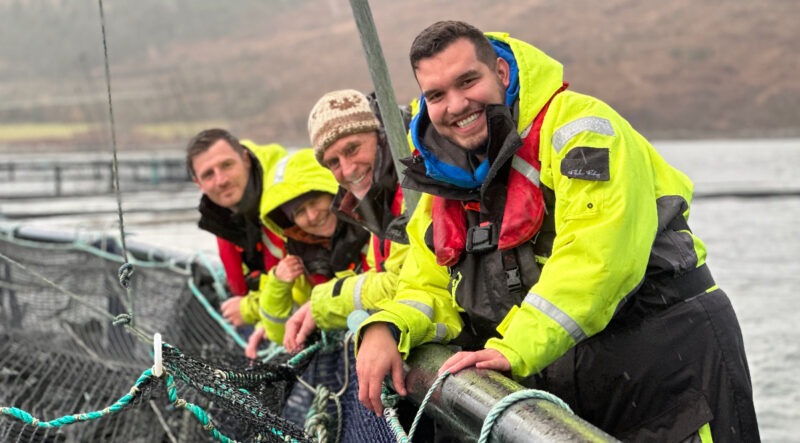Canada failing First Nations salmon farming communities in BC
“We are the stewards of our territories. We are salmon farmers. We have always managed these fish in our traditional territories, and we will continue to do so.” – Isaiah Robinson, Deputy Chief Councillor for Kitasoo Xai’xais Nation
By Fabian Dawson
SeaWestNews
First Nations leaders in British Columbia say the Federal Government has fallen short in honouring its constitutional duty to engage their communities meaningfully in decisions concerning the province’s aquaculture industry.
“It’s time for the federal government to honour their commitments to First Nations. This means honouring our sovereign rights to host and manage salmon farms in our territory,” said Hasheukumiss aka Richard George, hereditary Chief of the Ahousaht Nation.
In an op-ed published, George said proper dialogue between title holder Nations, such as Ahousaht, aquaculture operators, and the provincial and federal governments remains outstanding and necessary.
“Regrettably, the Canadian government has fallen short in honouring its constitutional duty to engage Ahousaht meaningfully in decisions concerning the aquaculture industry within our Haḥuułii (territory),” he wrote.
The Ahousaht is one of 17 BC First Nations which have agreements for farming salmon in their territories resulting in all salmon farmed in the province falling under a beneficial partnership with a First Nation.
There are now several legal challenges mounted by First Nations, aquaculture service and supply companies, and salmon farmers, over earlier decisions to shut down fish farms in British Columbia.
The Federal Government is currently working on an aquaculture Transition Plan for BC, expected in 2024. It will impact 79 open-net farms in BC which have been licensed to operate till next June and about 5,000 jobs.
“This jeopardizes Ahousaht’s constitutionally protected title, rights, and interests, as well as our social and economic well-being,” wrote George in the op-ed.
“Closing aquaculture facilities doesn’t only fly in the face of our rights as a nation. It means devastating job losses, food security concerns, and increased daily costs for Ahousaht musčim (people). It also threatens existing economic partnerships and agreements with aquaculture operators, undermining governance and economic stability.
In light of these concerns, Ahousaht urges the Canadian government to establish a transparent and fair process towards transition, including a comprehensive social and economic impact assessment in collaboration with affected Indigenous Nations, including Ahousaht.”
The Coalition of First Nations for Finfish Stewardship (FNFFS), which is urging Ottawa to renew the salmon farming licences for a period of nine years, said the future of modern salmon farming in BC must be shaped by the coastal First Nations.
The Coalition recently delivered its plan titled, “Indigenous-led Finfish Aquaculture Transition Framework” to the new Fisheries Minister Diane Lebouthillier stressing it will drive the social and ecological well-being for their territories and communities and enhance food security and affordability for all Canadians.
“Any further decision-making regarding the future of the sector must be done so with Rightsholder Nations at the table, and with their communities top of mind,” said Dallas Smith, spokesperson for the Coalition.
“We have proven we can be both salmon stewards and salmon farmers in our sovereign territories, and by asserting our rights and title with this comprehensive plan, we fully intend to lead this process to achieve what’s best for our communities,” he said.
The Coalition is calling for the completion of social and economic impact studies in First Nations communities as part of government efforts to transition the industry in BC.
Isaiah Robinson, Deputy Chief Councillor for Kitasoo Xai’xais Nation, is also calling for a transparent and fair transition process that will put a stop to misguided efforts to close down salmon farms in First Nations’ territories.
“We are the stewards of our territories. We are salmon farmers. We have always managed these fish in our traditional territories, and we will continue to do so.”
The Kitasoo/Xai’Xais began farming and processing salmon in the late 1980’s, forming a partnership for the business with Mowi in 1998, the first agreement developed by a salmon farming company and a First Nation in British Columbia.
“We are currently reengaging our community about salmon farming in our territory and will take our global learnings and local knowledge to inform the Federal Fisheries Minister throughout the Canadian government’s transition plan for salmon farming in B.C.,” said Robinson.
Robinson with members of the Kitasoo/Xai’xais Nation recently toured Mowi salmon farming operations in Scotland to help inform their community of Klemtu about international salmon aquaculture to help further develop their long-running seafood businesses.
The six-person delegation toured a recirculating aquaculture system, salmon farm, feed mill, traditional West Highland fish smoker, and Mowi’s value-added facility in Rosyth. In addition to seeing salmon aquaculture technologies, the group heard from experts regarding Scotland’s regulatory processes, wild and farmed fish interactions, and social responsibility.
“Our community is in its fifth decade of salmon farming and added value seafood processing, and we are always looking outside our territory for ways to improve and expand our seafood businesses,” he said.
Dr Diane Morrison, Managing Director at Mowi Canada West, who was part of the tour said: “It was important for us all to see that while many of our practices in British Columbia are very similar to those in Scotland, there are also some differences brought about by geography, market demand, and government support.”
“These similarities and differences are important for us to understand as we work with the Kitasoo Nation and other governments to advance our Blue Economy in Canada,” she said.
The Kitasoo/Xai’xais Nation tour of Scotland follows similar visits to Mowi operations in Norway.
(Image courtesy of Mowi L to R – Darren Wilson, Scalpay farm manager, Mowi Scotland, Dr Diane Morrison, Managing Director, Mowi Canada West, Larry Greba, Director, Kitasoo Development Corporation and Isaiah Robinson, General Manager, Kitasoo Development Corporation during their recent tour of aquaculture operations in Scotland)

